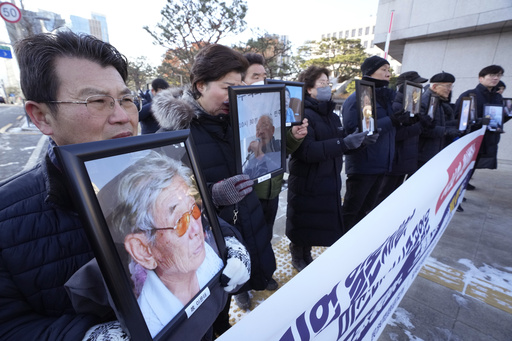SEOUL, South Korea (AP) — South Korea’s top court ordered two Japanese companies to financially compensate more of their wartime Korean workers for forced labor, as it sided Thursday with its contentious 2018 verdicts on the firms that caused a huge setback in relations between the Asian neighbors.
But observers said that Thursday’s ruling won’t likely hurt bilateral ties much since Seoul and Tokyo, now governed by different leaders, are pushing hard to bolster their partnerships in the face of shared challenges like North Korea’s evolving nuclear threats and China’s increasing assertiveness.
The Supreme Court ruled that Mitsubishi Heavy Industries must provide between 100 million and 150 million won ($76,700 and $115,000) in compensation to each of four plaintiffs — all bereaved families of its former employees who were forced to work for the company during Japan’s 1910-45 colonial rule of the Korean Peninsula. The court also said Nippon Steel Corp. must give 100 million won (about $76,700) to each of seven Korean plaintiffs, also all bereaved relatives, for similar colonial-era forced labor.
“I felt so sad when I heard the name of (my father) being stated as the deceased at today’s trial, but I was still really glad that we won — though it’s a bit late,” said Joo Soon-ja, daughter of the late Joo Seok-bong, a forced laborer, as she held her father’s large framed photo.
In two separate verdicts in 2018, the top South Korean court ordered Mitsubishi and Nippon Steel to compensate a total of 15 other Korean employees for forced labor. That irked Japan, which has insisted all compensation issues were already settled by a 1965 bilateral treaty that normalized their diplomatic relations. But the 2018 South Korean court rulings said that the treaty can’t prevent individuals from seeking compensation for forced labor, because Japanese companies’ use of such laborers were “acts of illegality against humanity” that were linked to Tokyo’s illegal colonial occupation and its war of aggression.
In Thursday’s ruling, the South Korean Supreme Court cited that argument in one of the 2018 verdicts, saying it paved the way for “a judicial remedy for forced labor victims within Republic of Korea.” Japan’s chief Cabinet secretary, Yoshimasa Hayashi, called the ruling “absolutely unacceptable,” saying it clearly violated the 1965 treaty.
The wrangling touched off by the 2018 rulings led to the two countries downgrading each other’s trade status, and Seoul’s previous liberal government threatening to spike a military intelligence-sharing pact. Their strained ties complicated efforts by the United States to build a stronger trilateral Washington-Seoul-Tokyo cooperation to counter challenges posed by North Korea and China.
The Seoul-Tokyo relations, however, began thawing after South Korea’s current conservative president, Yoon Suk Yeol, announced in March that his country would use a local corporate fund to compensate forced labor victims without demanding Japanese contributions. Japanese Prime Minister Fumio Kishida later expressed sympathy for the suffering of Korean forced laborers during a Seoul visit. The two countries revived high-level talks and withdrew economic retaliatory steps against each other.
On Thursday, the two countries held their first high-level economic talks in Seoul in about eight years.
Eleven of the 15 former forced laborers or their families involved in the 2018 rulings had accepted compensation under Seoul’s third-party reimbursement plan, but the remaining four still refuse to accept it, according to Lee Kook Un, a leader of their support group. He said that about 70 other suits seeking damages and targeting more than 10 Japanese companies are still underway.
Lim Soosuk, spokesperson of South Korea’s Foreign Ministry, told reporters Thursday that the government would try to provide compensation to the Korean plaintiffs related to Thursday’s ruling through the third-party reimbursement system as well. He said that the South Korean government would also continue necessary communication with Japan.
Choi Eunmi, a Japan expert at the Seoul-based Asan Institute for Policy Studies, said that Thursday’s ruling “won’t likely cause big troubles in Korea-Japan relationships,” because South Korea has already determined how to handle such verdicts with the establishment of the domestic compensation fund.
Choi said that because some forced labor victims refuse to accept compensation under the third-party reimbursement system, the South Korean fund hasn’t completely resolved the issue. But she said an attempt by a future South Korean government to spike the system would undermine South Korea’s credibility in Japan and deteriorate bilateral ties severely.
Yoon’s push to improve ties with Japan drew strong backlash from some of the forced labor victims and liberal opposition politicians, who have demanded direct compensation from the Japanese companies. But Yoon defended his move, saying it’s essential to boosting ties with Japan to jointly cope with North Korea’s advancing nuclear arsenal, the intensifying U.S.-China rivalry and global supply chain challenges.
___
Jiwon Song in Seoul, and Mari Yamaguchi in Tokyo, contributed to this report.
Source: post





